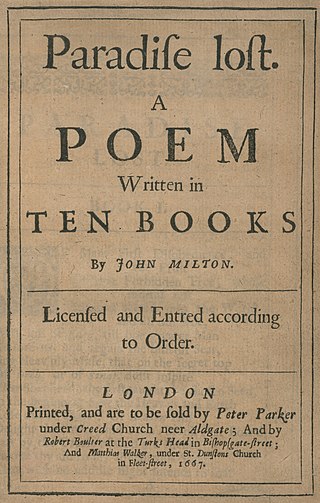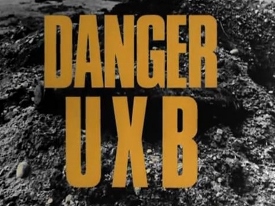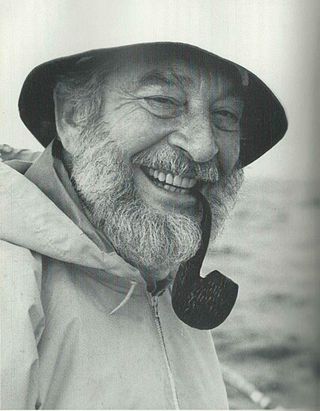Related Research Articles

The Nuremberg trials were held by the Allies against representatives of the defeated Nazi Germany for plotting and carrying out invasions of other countries and atrocities against their citizens in World War II.

Paradise Lost is an epic poem in blank verse by the 17th-century English poet John Milton (1608–1674). The first version, published in 1667, consists of ten books with over ten thousand lines of verse. A second edition followed in 1674, arranged into twelve books with minor revisions throughout. It is considered to be Milton's masterpiece, and it helped solidify his reputation as one of the greatest English poets of all time. The poem concerns the biblical story of the fall of man: the temptation of Adam and Eve by the fallen angel Satan and their expulsion from the Garden of Eden.

Julius Streicher was a member of the Nazi Party, the Gauleiter of Franconia and a member of the Reichstag, the national legislature. He was the founder and publisher of the virulently antisemitic newspaper Der Stürmer, which became a central element of the Nazi propaganda machine. The publishing firm was financially very successful and made Streicher a multi-millionaire.

Forbidden fruit is a name given to the fruit growing in the Garden of Eden which God commands mankind not to eat. In the biblical story, Adam and Eve eat the fruit from the tree of the knowledge of good and evil and are exiled from Eden.
And the Lord God commanded the man, saying, Of every tree of the garden thou mayest freely eat: But of the tree of the knowledge of good and evil, thou shalt not eat of it: for in the day that thou eatest thereof thou shalt surely die.

Guy Edward Barham Walters is a British author, historian, and journalist. He is the author and editor of nine books on the Second World War, including war thrillers, and a historical analysis of the Berlin Olympic Games.

Casino Royale is the first novel by the British author Ian Fleming. Published in 1953, it is the first James Bond book, and it paved the way for a further eleven novels and two short story collections by Fleming, followed by numerous continuation Bond novels by other authors.

Benjamin Berell Ferencz was an American lawyer. He was an investigator of Nazi war crimes after World War II and the chief prosecutor for the United States Army at the Einsatzgruppen trial, one of the 12 subsequent Nuremberg trials held by US authorities at Nuremberg, Germany. When the Einsatzgruppen reports were discovered, Ferencz pushed for a trial based on their evidence. When confronted with a lack of staff and resources, he personally volunteered to serve as the prosecutor.

Danger UXB is a 1979 British ITV television series set during the Second World War. It was developed by John Hawkesworth and starred Anthony Andrews as Lieutenant Brian Ash, an officer in the Royal Engineers (RE).
Robert Pugh is a Welsh actor, known for his many television appearances, including the role of Craster in the HBO series Game of Thrones.

Adam and Eve, according to the creation myth of the Abrahamic religions, were the first man and woman. They are central to the belief that humanity is in essence a single family, with everyone descended from a single pair of original ancestors. They also provide the basis for the doctrines of the fall of man and original sin that are important beliefs in Christianity, although not held in Judaism or Islam.
Colonel Bertram Stuart Trevelyan Archer,, known as Stuart Archer, was a recipient of the George Cross, the highest British and Commonwealth award for gallantry not in the face of the enemy. On 3 February 2015 Archer became the first recipient of the Victoria Cross or the George Cross to reach 100 years of age.
Michael Floud Blaney, GC, known as Max Blaney, was posthumously awarded the George Cross for defusing enemy bombs during the Blitz in 1940.
George Cameron Wyllie, GC of the Royal Engineers was awarded the George Cross for the heroism he displayed on 12 September 1940 when a 1,000-kilogram (2,200 lb) bomb fell near St Paul's Cathedral in Deans Yard. It took three days to dig the bomb out of soft soil, work made even more dangerous by a fire at a fractured gas main. Wylie and his team placed the recovered bomb on a lorry, which was driven to Hackney Marshes, where the bomb was detonated, leaving a crater 100 feet (30 m) wide.
Leonard Henry Harrison was a Royal Air Force (RAF) officer who was awarded the George Cross "for acts of exceptional coolness and courage on several occasions" in defusing unexploded German bombs during the Second World War. Having joined the RAF in 1922, he served as Civilian Armament Instructor at a RAF armament training school in 1940 and was an authority on explosive fuse systems. He used this expertise to render many munitions safe, including a bomb with a previously unknown fuse that had lodged in the deck of a grain carrier which struggled into Immingham Docks, which he defused with Flight Lieutenant John Noel Dowland. He also defused a device on a fishing boat in the Humber. His award was published in the London Gazette and was also covered by the Saturday News Chronicle of 4 January 1941.
Robert John Davies, GC was a Royal Engineers officer who was awarded the George Cross (GC) for the heroism he displayed in defusing a bomb which threatened to destroy St Paul's Cathedral on 12 September 1940.
Jack Maynard Cholmondeley Easton, GC was an officer of the Royal Naval Volunteer Reserve (RNVR) who was awarded the George Cross for gallantry in defusing a parachute mine at Hoxton, the East End of London, during the Blitz on 17 October 1940. Notice of his award appeared in the London Gazette on 23 January 1941.
Major Cyril Arthur Joseph Martin, GC, MC was a British Army officer who was awarded the George Cross (GC) for the courage he showed in defusing a device while serving with the Corps of Royal Engineers Bomb Disposal Squad on 17/18 January 1943 in Battersea, London.

The following is a bibliography of works devoted to the Nuremberg Trials.

Alfred de Marigny was a French Mauritian acquitted of the murder of his father-in-law, Sir Harry Oakes.
Serpents are referred to in both the Hebrew Bible and the New Testament. The symbol of a serpent or snake played important roles in the religious traditions and cultural life of ancient Greece, Egypt, Mesopotamia, and Canaan. The serpent was a symbol of evil power and chaos from the underworld as well as a symbol of fertility, life, healing, and rebirth.
References
- ↑ "Lion Television, Murder in Paradise". Archived from the original on 12 February 2007. Retrieved 8 December 2006.
- ↑ Owen, James (24 June 2010). The scruffy earl who swung the war London: The Daily Telegraph. Retrieved 8 January 2011
- ↑ Owen, James (28 November 2010). Murder in Paradise - the scandal that ensnared an abdicated king. London: The Sunday Times. Retrieved 8 January 2011
- ↑ Berlins, Marcel (18 October 2006). Terry Lloyd, a British citizen, is killed unlawfully by the US Army. What does our government do? Nothing. London: The Guardian. Retrieved 8 January 2011
- ↑ Owen, James (26 September 2010). Blown apart: the myth of the bomb at St Paul's cathedral. London: The Sunday Times. Retrieved 8 January 2011 [ dead link ]